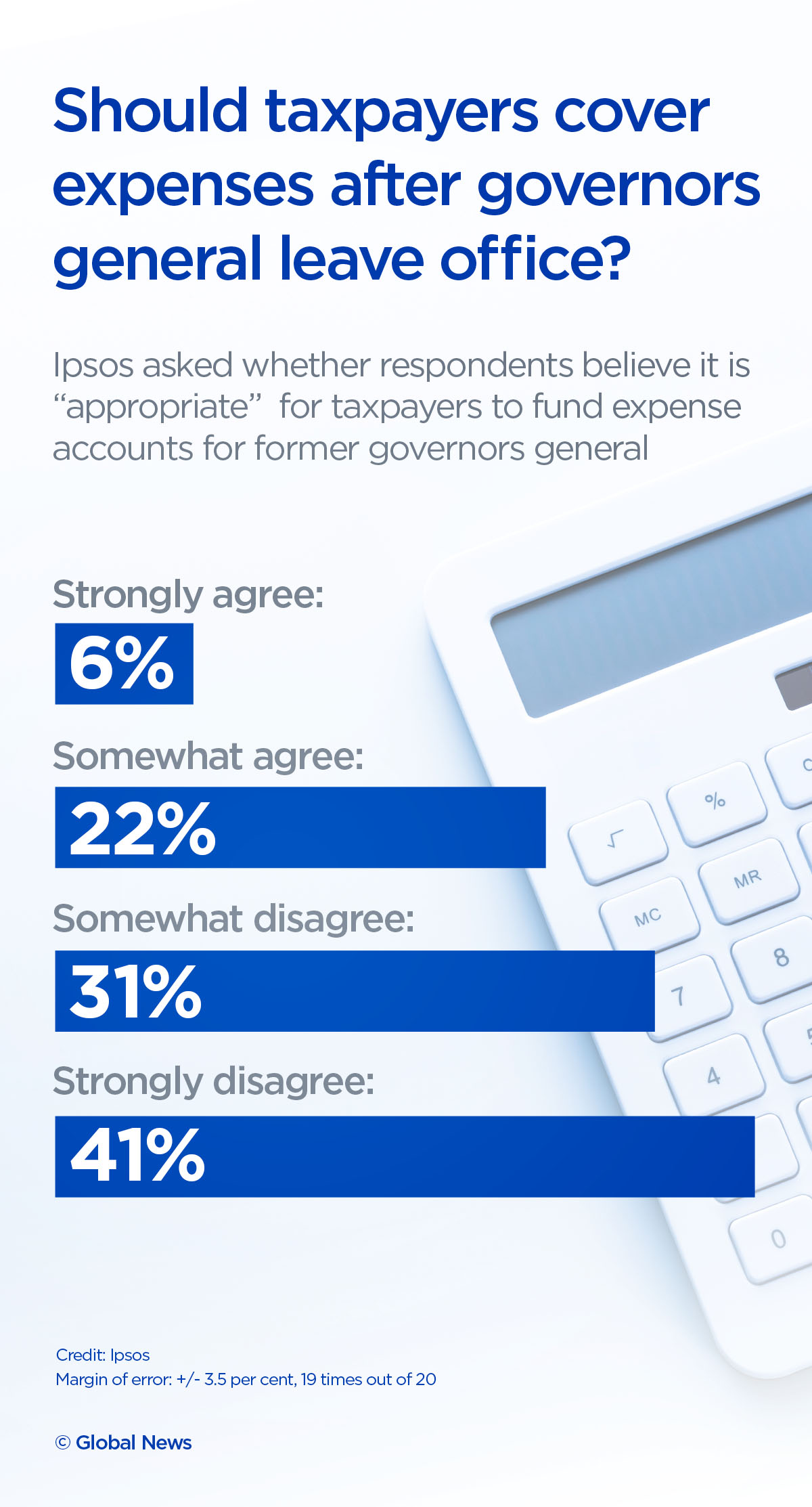A clear majority of Canadians believe former governor general Julie Payette should receive neither a pension nor an expense account given her unprecedented early resignation from the post amid workplace bullying allegations, a new poll suggests.

According to the poll, done exclusively for Global News by Ipsos, 80 per cent of Canadians say Payette should not receive a pension while 72 per cent say neither she nor any other former governors general should get expense accounts after leaving office.
What’s more, the poll found that support for Canada ending its ties to the monarchy has risen to the highest level in a decade.
“It’s not often that we ask a question in which we get 80 per cent of the population agreeing to something,” said Darrell Bricker, CEO of Ipsos Public Affairs, pointing to the majority disapproval of a pension or perks for Payette.
“When you get to 80 per cent, you’re basically representing everybody. So this is not a partisan type of issue. There’s a very strong consensus amongst the Canadian population.”

READ MORE: Rideau Hall won’t say how much Canadians paid for travel by spouses of former GGs
Ipsos asked respondents whether they believe it is “appropriate” for Canadian taxpayers to be paying for expense accounts for former governors general after they leave office.
Only six per cent said they strongly agree that taxpayers should do so.
Twenty-two per cent said they somewhat agree that doing so is appropriate, while 31 per cent said they somewhat disagree that doing so is appropriate, and 41 per cent said strongly that it is not.
In the wake of Payette’s resignation, which followed an independent review of the workplace at Rideau Hall and documented extensive concerns raised by staff, the perks and lifelong benefits afforded to former governors general have come under scrutiny amid questions on whether Payette deserves them.
Despite resigning early amid explosive allegations of bullying and at least one workplace complaint, Payette will receive an annuity of roughly $150,000 for the rest of her life as is mandated in law for former governors general.

Get daily National news
As well, former governors general get access to an expense account of more than $200,000 per year to cover a range of expenses related to their former roles, including travel by their spouses.
Some also get multi-million-dollar startup grants to fund foundations after they leave office. The government has spent roughly $30 million on those grants in the last 15 years, but officials have said that funding is discretionary and is not guaranteed.
The concerns on the funding for former governors general come as support for ending the monarchy reaches its highest level in a decade.
Amid that scrutiny of the perks afforded to the monarch’s representative, the poll also suggests 60 per cent of Canadians believe the country’s ties to the monarchy should end once Queen Elizabeth II dies.
That’s up from 53 per cent last year, and marks the highest level of support for ditching the monarchy that has been seen in recent years.
It’s an increase of seven points since February 2020 when Prince Harry and Meghan Markle, Duchess of Sussex, quit their royal duties. It is also an increase of 12 points since June 2011, shortly after the wedding of the Duke and Duchess of Cambridge, Prince William and Catherine Middleton.
Even in Ontario, where Ipsos polling data has normally found strong pro-monarchy attitudes, 49 per cent of respondents said the monarchy should end with the Queen’s reign.

However, Canadians appear to be divided on what form of government should replace the monarchy, and only 51 per cent said Canada should become a republic like the United States.
The online poll surveyed 1,000 Canadians over the age of 18 between Feb. 2 and 3.
That’s less than a month after the former U.S. president, Donald Trump, was impeached for inciting an insurrection that saw a violent mob storm the Capitol building in an attempt to stop the certification of the results of the presidential election in November 2020, which President Joe Biden won.
The level of support for Canada becoming a republic is unchanged from two years ago, and within the five-point range recorded in answers to the same question over the last two decades.
READ MORE: Formal complaint made amid Payette probe, despite former GG’s claim none filed
Despite the disapproval of some of the perks set to go to Payette, Bricker said the data suggests many Canadians — 60 per cent — still believe the role helps to ensure a peaceful transfer of power.
That number is shifting though, and will likely continue to do so as the Canadian population continues to grow more diverse, primarily through immigration.
“We do see that over time, there’s kind of a gradual erosion of of the relationship between the Crown and Canadian society,” Bricker said.
“But it’s not like there’s a burning desire to make a break with those institutions.”
Exclusive Global News Ipsos polls are protected by copyright. The information and/or data may only be rebroadcast or republished with full and proper credit and attribution to “Global News Ipsos.” This poll was conducted between Feb. 2 and Feb. 3, 2021, with a sample of 1,000 Canadians aged 18+ interviewed online. The precision of Ipsos online polls is measured using a credibility interval. This poll is accurate to within ± 3.5 percentage points, 19 times out of 20, had all Canadians aged 18+ been polled.









Comments
Want to discuss? Please read our Commenting Policy first.